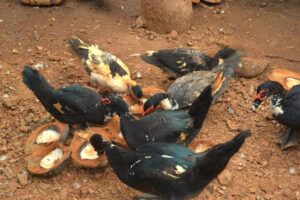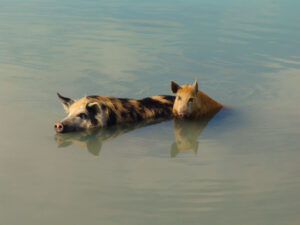 Aspects of animal welfare are central to all organic standards. Pacific farmers have long raised pigs and chickens, while other animals are also important in some regions. Animals are an essential component of the mixed farming systems found throughout the region. They have cultural value, and also contribute to food security and soil fertility.
Aspects of animal welfare are central to all organic standards. Pacific farmers have long raised pigs and chickens, while other animals are also important in some regions. Animals are an essential component of the mixed farming systems found throughout the region. They have cultural value, and also contribute to food security and soil fertility.
A wider range of animals are now being farmed in the Pacific and organic agriculture in the region incorporates the best approaches from traditional experience and organic principles.
Livestock husbandry is based on maintaining a harmonious relationship between land, plants and livestock, with minimum disruption to ecosystems.
It will also ensure that the physiological and behavioural needs of livestock are respected and the animals are fed good-quality organically grown feedstuffs.
Animals must have access to sufficient fresh air and enough clean water and nutritious feed to satisfy their needs and also access to protection from sunlight, excessive noise, heat, rain, mud and wind to reduce stress and ensure their well-being.
Traditionally, livestock were treated with great care because of their relative rarity, and cultural and intrinsic values.
 This aligns well with organic farming principles, which respect the welfare of animals and encourage the selection of species and breeds that do not require any sort of mutilation.
This aligns well with organic farming principles, which respect the welfare of animals and encourage the selection of species and breeds that do not require any sort of mutilation.
The welfare of the animal is a priority – if an animal becomes sick or injured despite preventive measures, it must be treated promptly.
The initial use of natural, herbal or homeopathic products or practices is recommended in preference to the use of chemically synthesised veterinary products but producers must not withhold medication if it will result in unnecessary suffering for livestock, even if the use of the medication will cause the animal to lose its organic status.